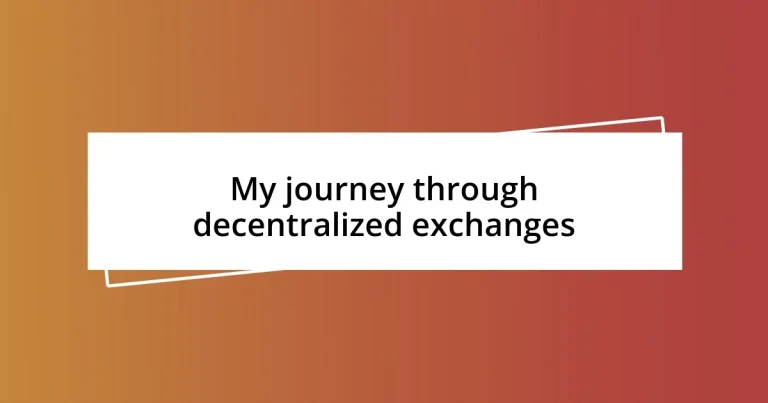Key takeaways:
- Decentralized exchanges (DEXs) empower users by enabling direct cryptocurrency trading through smart contracts, emphasizing control and autonomy.
- Key benefits of DEXs include enhanced privacy, lower trading fees, and the ability to manage assets directly in personal wallets.
- Common pitfalls when using DEXs involve high gas fees, lack of customer support, and the need for diligent security practices to avoid scams.
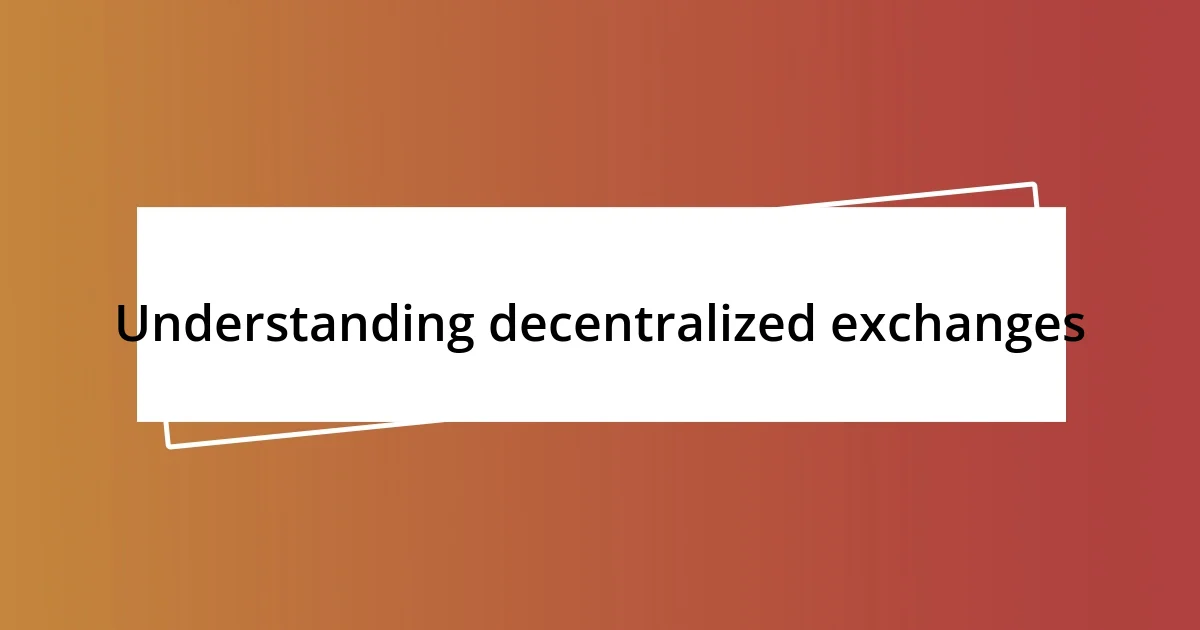
Understanding decentralized exchanges
Decentralized exchanges (DEXs) operate without a central authority, allowing users to trade cryptocurrencies directly with one another. I remember my first encounter with a DEX; the freedom it offered was exhilarating, yet it felt a bit daunting as I navigated this unfamiliar territory. Have you ever wondered what it’s like to be in complete control of your trades, without relying on intermediaries?
What truly sets DEXs apart is their reliance on smart contracts—self-executing agreements with the terms of the trade directly written into code. I find this concept fascinating because it eliminates the need for trust in a central entity. When I used a DEX for the first time, it amazed me how a program could facilitate complex trades seamlessly, and it made me question my previous assumptions about financial transactions.
However, using DEXs isn’t without its challenges. I once faced a frustrating situation where I miscalculated gas fees, which impacted my trading experience. It made me realize that while DEXs empower users, they also demand a greater level of personal diligence and understanding. Isn’t it intriguing how autonomy comes with responsibility? Understanding these nuances is crucial as you venture into the world of decentralized exchanges.
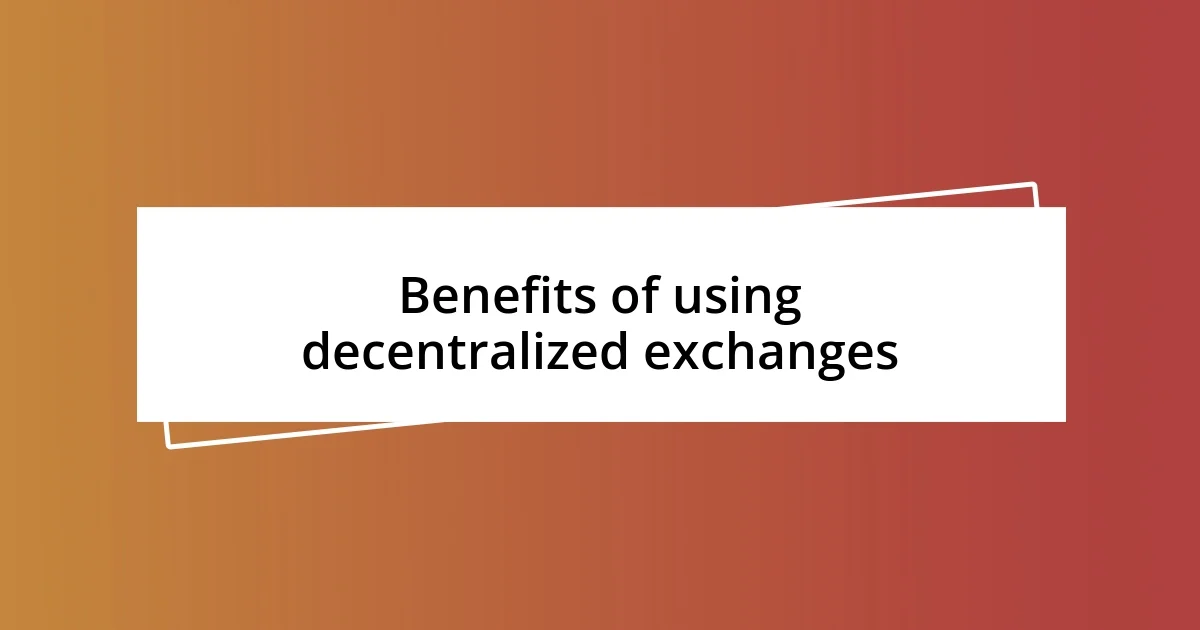
Benefits of using decentralized exchanges
Decentralized exchanges offer unparalleled control over my trades, allowing me to manage my assets directly without the intervention of a central authority. I vividly recall the first time I made a trade on a DEX; it felt like taking the training wheels off a bike for the first time. The security of holding my crypto assets in my own wallet, rather than entrusting them to a centralized exchange, gave me a newfound sense of freedom and empowerment. Have you experienced that exhilarating feeling of being in the driver’s seat of your financial journey?
One major benefit that stands out to me is the enhanced privacy that DEXs provide. Unlike traditional exchanges, which often require personal identification and data verification, I appreciated that I could trade without compromising my identity. It reminded me of the first time I realized that I could participate in an activity without feeling the weight of someone else’s surveillance. This anonymity really resonates with those who value their privacy, don’t you think?
Moreover, the lower fees associated with DEXs often leave more of my earnings intact. I recall a time when I mistakenly paid exorbitant fees on a centralized platform, which was disheartening considering how quickly they added up. Using a DEX allows me to bypass those hefty fees, letting me reinvest or trade more effectively. Suddenly, it becomes clearer how the shift to decentralized platforms can positively impact our trading strategies in the long run.
| Benefits | Decentralized Exchanges (DEXs) |
|---|---|
| Control | User retains full control over their assets |
| Privacy | Anonymity without personal identification requirements |
| Lower Fees | Reduced trading fees compared to centralized exchanges |
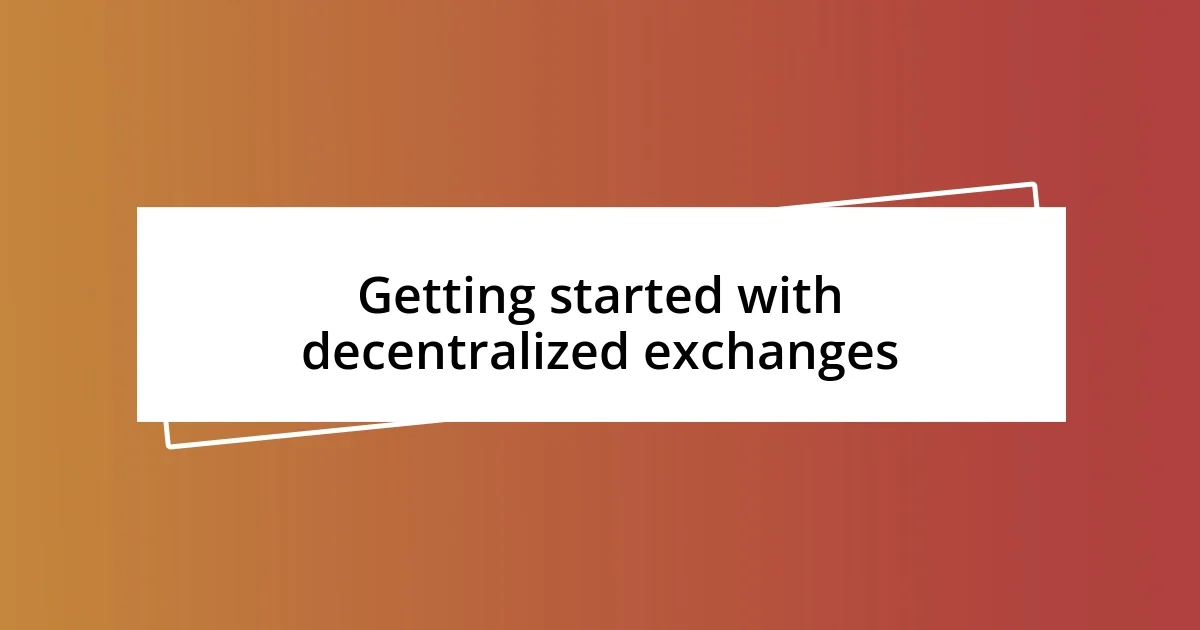
Getting started with decentralized exchanges
Getting started with decentralized exchanges can feel overwhelming at first, but it opens up a new world of trading possibilities. I recall the moment I decided to take the plunge; my heart raced with anticipation as I created my wallet and explored the various platforms. The user interfaces can vary significantly, and I found it helpful to start with DEXs that offer intuitive navigation. Have you ever felt that mix of excitement and apprehension when trying something new?
To ease yourself into this journey, here are some essential steps to consider:
- Choose a Wallet: Select a crypto wallet that supports DEX tokens; I recommend starting with a user-friendly option.
- Research DEX Platforms: Find a DEX that matches your trading preferences and has a good reputation; exploring user reviews can provide valuable insights.
- Understand the Fees: Learn about trading fees and slippage to avoid surprises; the first time I traded, I didn’t calculate these well.
- Familiarize Yourself with Swapping: Spend time getting comfortable with the swap functions; knowing how to use them effectively can boost your confidence.
Remember, even small steps can lead to significant progress as you learn the ropes.
As I ventured further into the world of DEXs, one essential tip I’d pass on is mastering the concept of liquidity pools. Initially, I had no idea how they worked, but understanding them made a world of difference in my trading experience. The moment I earned my first yield from staking in a liquidity pool was electrifying! It felt like my investments were working for me while I slept. Have you ever felt that rush of excitement knowing you’re putting your assets to good use?
Here’s a brief overview of what you need to know about liquidity pools:
- What They Are: Liquidity pools are collections of funds locked in a smart contract to facilitate trading; they allow for seamless swaps between assets.
- Benefits of Providing Liquidity: I discovered that adding to these pools can earn you transaction fees, giving you a little extra for your efforts.
- Risks Involved: Keep in mind, though, that providing liquidity isn’t without its risks, including impermanent loss; this happened to me on a few occasions, and I learned to research beforehand.
Frankly, I found that diving into liquidity pools added an extra layer of excitement to my DEX journey, making it feel less transactional and more dynamic.
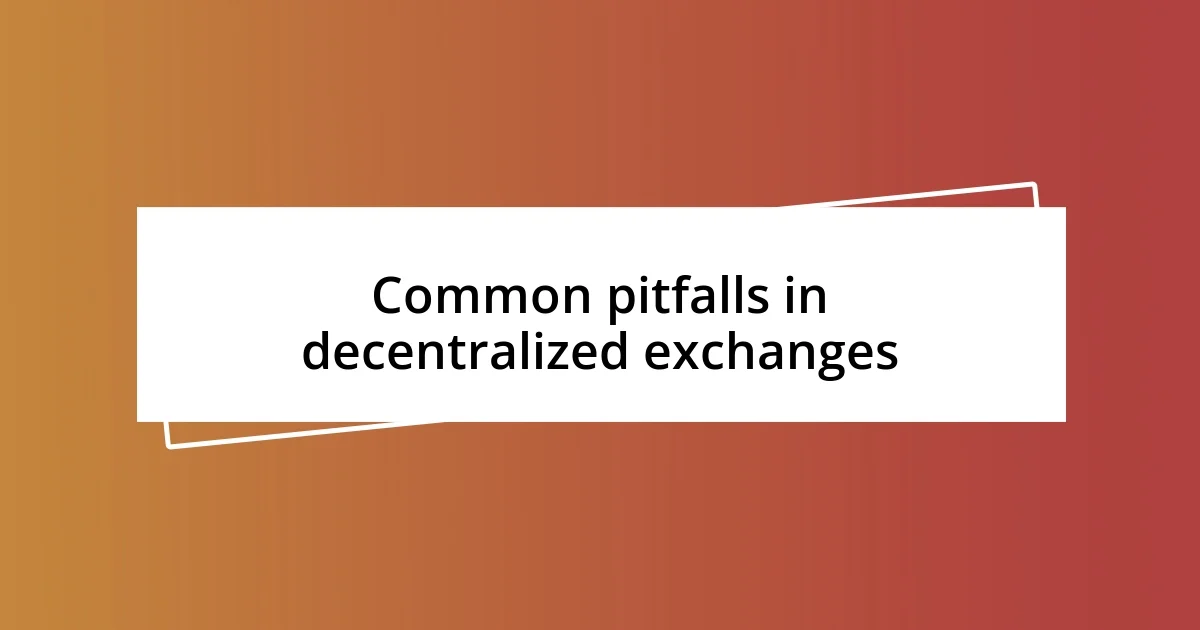
Common pitfalls in decentralized exchanges
One common pitfall I often encountered in decentralized exchanges is the issue of gas fees. I remember my excitement during a late-night trading session when the network congestion skyrocketed unexpectedly, sending my gas fee estimates through the roof. It was a lesson learned; underestimating these fees can quickly eat into potential profits. Have you ever found yourself in a situation where suddenly, trading became more costly than you anticipated?
Another challenge relates to the lack of customer support on many DEXs. I once spent an agonizing several hours trying to recover funds after a transaction went awry, and I felt completely lost without a support team to guide me. Navigating DEXs means we sometimes must rely on community forums and social media for help, which can be daunting if you’re not familiar with the space. You might find yourself asking, how do you solve a problem without a conventional help desk?
Security is a critical concern as well. While I’ve experienced the freedom of holding my assets, I also learned that the responsibility for security lies entirely on my shoulders. There was a moment when I almost fell for a phishing scam, thinking I was accessing my wallet on a trusted platform. It made me realize that vigilance is key; simple steps like verifying URLs can save you from significant headaches. Have you ever been in a position where a moment’s oversight could have cost you dearly?












